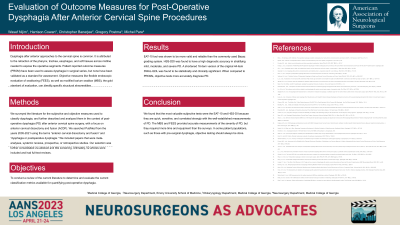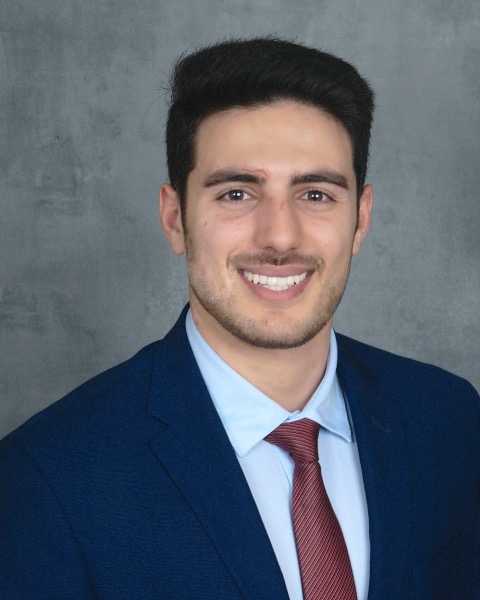Evaluation of Outcome Measures for Post-Operative Dysphagia After Anterior Cervical Spine Procedures
Evaluation of Outcome Measures for Post-operative Dysphagia After Anterior Cervical Spine Procedures
Friday, April 21, 2023


Wasef Nijim, BS
Medical Student
Medical College of Georgia
Augusta, Georgia, United States
ePoster Presenter(s)
Introduction: Dysphagia after anterior approaches to the cervical spine is common. It is attributed to the retraction of the pharynx, trachea, esophagus, and soft tissues across midline needed to expose the operative segments. Patient reported outcome measures (PROM) have been used to assess dysphagia in surgical series, but none have been validated as a standard for assessment. Objective measures like flexible endoscopic evaluation of swallowing (FEES), as well as modified barium swallow (MBS), the gold standard of evaluation, can identify specific structural abnormalities.
Methods: We surveyed the literature for the subjective and objective measures used to
classify dysphagia, and further described and analyzed them in the context of post-operative dysphagia (PD) after anterior cervical spine surgery, with a focus on anterior cervical discectomy and fusion (ACDF). We searched PubMed from the years 2005-2021 using the terms “anterior cervical discectomy and fusion” and “dysphagia or postoperative dysphagia.” We included papers that were meta-analyses, systemic reviews, prospective, or retrospective studies. Our selection was further consolidated via abstract and title screening. Ultimately, 52 articles were included and had full-text reviews.
Results: EAT-10 tool was shown to be more valid and reliable than the commonly used Bazaz grading system. HSS-DDI was found to have a high diagnostic accuracy in stratifying mild, moderate, and severe PD. A shortened 16-item version of the original 44-item SWAL-QOL was found to be statistically and clinically significant. When compared to PROMs, objective tests more accurately diagnose PD.
Conclusion : We found that the most valuable subjective tests were the EAT-10 and HSS-DI because they are quick, sensitive, and correlated strongly with the well-established measurements of PD. The MBS and FEES provided accurate measurements of the severity of PD, but they required more time and equipment than the surveys. In some patient populations, such as those with pre-surgical dysphagia, objective testing should always be done.
Methods: We surveyed the literature for the subjective and objective measures used to
classify dysphagia, and further described and analyzed them in the context of post-operative dysphagia (PD) after anterior cervical spine surgery, with a focus on anterior cervical discectomy and fusion (ACDF). We searched PubMed from the years 2005-2021 using the terms “anterior cervical discectomy and fusion” and “dysphagia or postoperative dysphagia.” We included papers that were meta-analyses, systemic reviews, prospective, or retrospective studies. Our selection was further consolidated via abstract and title screening. Ultimately, 52 articles were included and had full-text reviews.
Results: EAT-10 tool was shown to be more valid and reliable than the commonly used Bazaz grading system. HSS-DDI was found to have a high diagnostic accuracy in stratifying mild, moderate, and severe PD. A shortened 16-item version of the original 44-item SWAL-QOL was found to be statistically and clinically significant. When compared to PROMs, objective tests more accurately diagnose PD.
Conclusion : We found that the most valuable subjective tests were the EAT-10 and HSS-DI because they are quick, sensitive, and correlated strongly with the well-established measurements of PD. The MBS and FEES provided accurate measurements of the severity of PD, but they required more time and equipment than the surveys. In some patient populations, such as those with pre-surgical dysphagia, objective testing should always be done.
